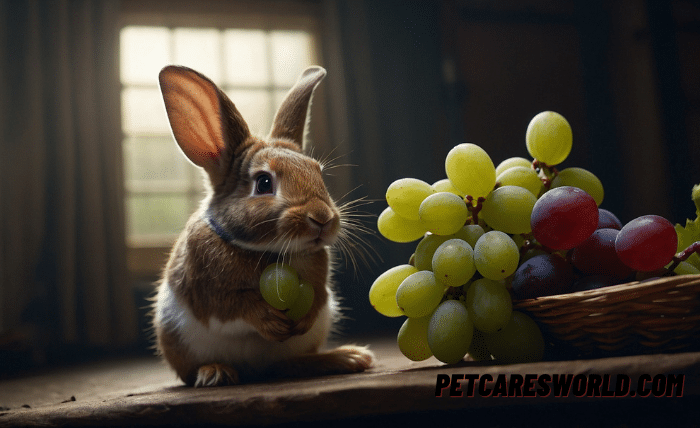Rabbits are adorable creatures that often captivate us with their fluffy appearance and playful antics. As responsible pet owners, it’s crucial to understand the dietary needs of our furry companions to ensure their health and well-being. One common question that arises is, Can rabbits have grapes? In this comprehensive guide, we will delve into the topic, shedding light on the suitability of grapes in a rabbit’s diet and offering insights into their nutritional requirements.
Understanding the Rabbit’s Digestive System
Rabbits possess a unique digestive system that is finely tuned to process fibrous plant material. Their diet primarily consists of hay, fresh vegetables, and a limited amount of fruits. Unlike humans, rabbits cannot vomit, which means any food that they consume must pass through their digestive tract efficiently. Any disruption or imbalance in their diet can lead to serious health issues such as gastrointestinal stasis.
The Importance of a Balanced Diet for Rabbits
A balanced diet is essential for maintaining a rabbit’s overall health and vitality. It provides them with the necessary nutrients, vitamins, and minerals to support their bodily functions and promote optimal growth and development. However, it’s equally important to understand that not all foods are safe for rabbits to consume.
A diet that is high in sugar or low in fiber can predispose rabbits to various health problems, including obesity, dental issues, and digestive disorders. Therefore, pet owners must carefully select and monitor the foods they offer to their rabbits, ensuring that they meet their dietary requirements without compromising their well-being.
Grapes and Their Suitability for Rabbits
Grapes are a popular fruit enjoyed by humans for their sweet and juicy flavor. However, when it comes to rabbits, caution must be exercised. While grapes are not inherently toxic to rabbits, they pose certain risks that pet owners should be aware of. Grapes contain natural sugars, which, when consumed in excess, can lead to obesity and other health issues in rabbits.
Furthermore, grapes also contain compounds such as tannins, which may cause digestive upset in some rabbits. Ingesting grapes with seeds can also pose a choking hazard or lead to intestinal blockages. Therefore, it is advisable to exercise caution when offering grapes to rabbits and to do so in moderation.
Alternatives to Grapes in a Rabbit’s Diet
For pet owners looking to provide their rabbits with a variety of fruits as treats, there are several safe alternatives to grapes that can be considered. These include small portions of strawberries, apples (without seeds), blueberries, and slices of banana. It’s important to introduce new foods gradually and observe how your rabbit responds to them.
By offering a diverse range of fruits and vegetables, pet owners can ensure that their rabbits receive a well-rounded diet that meets their nutritional needs and preferences. Remember to wash all fruits and vegetables thoroughly to remove any pesticides or residues that may be present on the surface.
Monitoring Your Rabbit’s Health
In addition to providing a balanced diet, monitoring your rabbit’s health is essential for detecting any potential issues early on. Keep an eye on their eating habits, stool quality, and overall demeanor. Any changes in behavior or appetite should be promptly addressed by a veterinarian.
Regular check-ups and dental exams are also recommended to ensure that your rabbit’s teeth are healthy and properly aligned. Dental problems are common in rabbits and can arise due to a diet lacking in fibrous material or genetic factors.
Conclusion
While grapes are not toxic to rabbits, they should be offered sparingly and as part of a balanced diet. Pet owners should exercise caution when introducing new foods to their rabbits and be mindful of their nutritional needs and sensitivities. By providing a diverse range of fresh vegetables, hay, and occasional fruit treats, you can help ensure that your rabbit remains healthy and happy for years to come.

